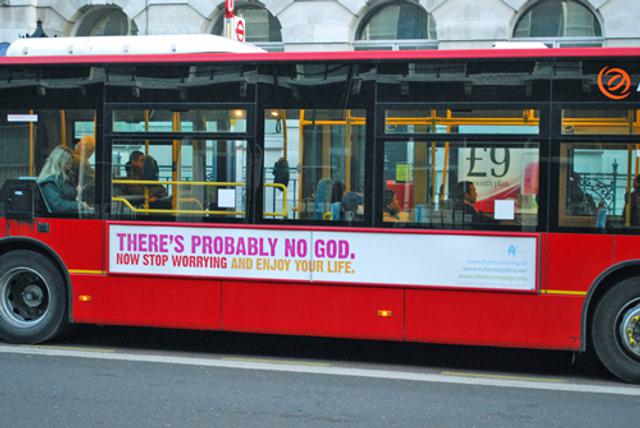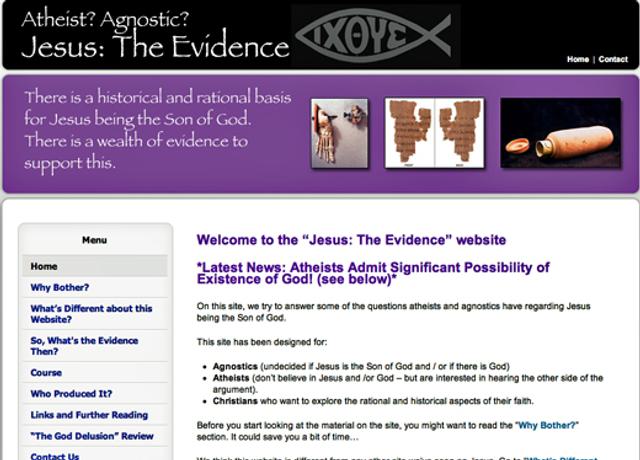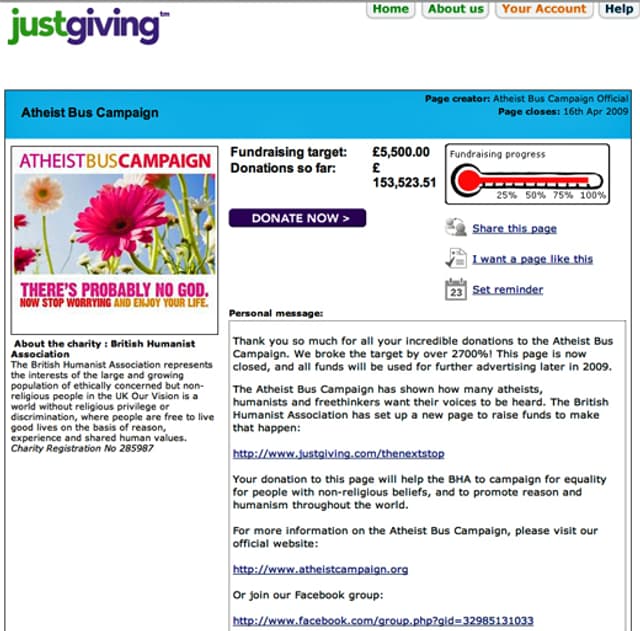The British Humanist Association: the atheist bus campaign
- Exhibited by
- Christiana Stergiou.
- Added
- June 20, 2012
- Medium of Communication
- Face to face, online.
- Target Audience
- Awareness, single gift, social change campaign.
- Type of Charity
- Religion related, special interest.
- Country of Origin
- UK.
- Date of first appearance
- October, 2008.
SOFII’s view
The Atheist Bus campaign was a fundraising whirlwind. Starting off with a small target and using an online donations portal, the campaign built momentum through a storm of media attention and a simple call to action.
This campaign shows that you don’t need your own website, or a huge fundraising campaign to turn your vision into reality. The three key ingredients for this campaign were a vision that resonated with its audience, a strong dose of controversy to generate publicity and some simple technology to help it all happen.
Creator / originator
The British Humanist Association and Ariane Sherine.
Summary / objectives
This was a campaign to promote the joy of atheism and was inspired by the proliferation of London bus ads promoting Christianity. The original fundraising objective was to raise £5,500 to place ads on buses that promoted atheism instead.
Background
It all started with an idea from Ariane Sherine, writer of the Comment is Free column in the Guardian online newspaper. In her June 2008 column, she bemoaned the proliferation of Christian advertising on London buses. Her column ended with a simple idea, ‘…If there are 4,680 atheists reading this and we all contribute £5, it’s possible that we can fund a much-needed atheist London bus ad with the slogan: There’s probably no God. Now stop worrying and get on with your life.’
Comment is Free readers enthusiastically embraced the idea and within months, the British Humanist Association jumped on board to administer the donations. A donation page was hosted by the UK online giving portal JustGiving, with a modest fundraising target of £5,000.
Well-known atheist Professor Richard Dawkins agreed to match that £5,500 target, doubling the campaign’s potential income to £11,000, which would extend funding to two sets of ads on 30 buses for four weeks.
Launched in October 2008, the campaign generated immense worldwide publicity and significantly exceeded its fundraising target.
Special characteristics
The method of giving was simple – the online donations portal www.justgiving.com/atheistbus.
Influence / impact
The Atheist Bus campaign has inspired like-minded groups all over the the world, including the Netherlands, Italy, Canada and the USA. Additional activities are planned in the UK, including a new book, edited by Ariane Sherine, The Atheist’s Guide to Christmas (published by Harper Collins).
Results
The target of £5,500 was met by 10 am on the day of the launch. In the end, the campaign ran for six months and raised just over £150,000.
Merits
It is a perfect match between a brilliant idea that generates real public interest and the technology that can make it easily happen.
Other relevant information
This exhibit was inspired by the IFC Online Conference, held by the Resource Alliance in 2009. Katya Andresen, author of Robin Hood Marketing, had the following advice: ‘Firstly get someone’s attention by connecting existing values, feelings and desires. Then, convert that into action. And make it memorable.’
That’s exactly what the Atheist Bus campaign did.

 View original image
View original image
Also in Categories
-

















